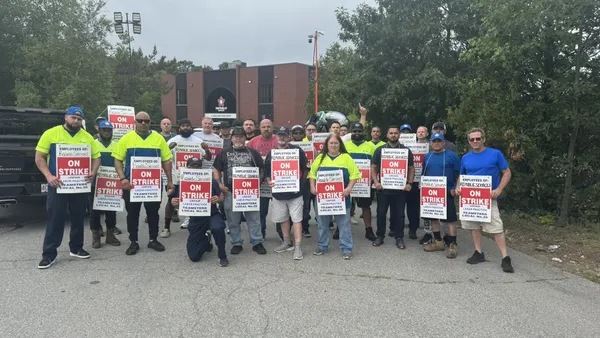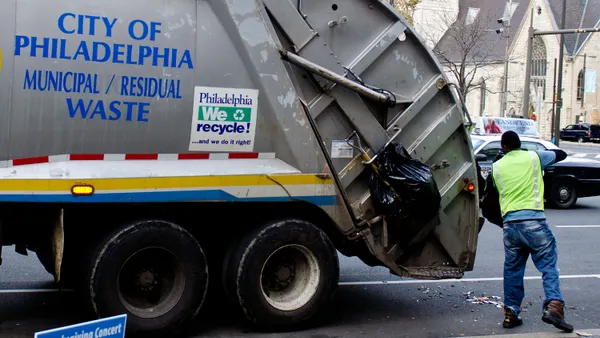Dive Brief:
- The Dallas-Fort Worth Metroplex will be the first beneficiary of a partnership between the country's three largest distributors of plastic bottles and major players in the recycling sector. The American Beverage Association's Every Bottle Back initiative recently announced it will invest $3 million into the area, the beginning of a pledged $100 million drive to encourage recycling outreach, education and infrastructure.
- A local Balcones Resources MRF will receive $2 million of the total, much of which will go to "state-of-the-art technology," including optical sorters, robotic arms and new belt configurations. A drive to expand access to multifamily housing complexes is also a significant part of the funding, with a focus on upgraded collection vehicles, improved signage and new containers.
- The public-private partnership will include significant assistance from the cities involved. "Fort Worth will be rolling out expanded educational efforts with additional curbside recycling cart audits, targeted cart tags and in-home information, helping to measure the increased efforts with increased recycling and decreased contamination," Robert Smouse, Fort Worth's assistant director for solid waste services, told Waste Dive.
Dive Insight:
Multifamily housing complexes have long posed a hurdle for recycling and are a major target of the project. Texas is also home to a number of plants that recycle PET. ABA estimates the new investment will reach some 50,000 people in the Dallas-Fort Worth area with its expansion efforts.
Cody Marshall, chief community strategy officer for The Recycling Partnership (TRP), told Waste Dive the organization considers multifamily recycling a "key focus area," and that ABA has expressed interest in that emphasis. TRP is one of several organizations involved with the initiative, which brought together Coca-Cola Co., Keurig Dr Pepper, and PepsiCo, along with ABA, Closed Loop Partners (CLP), and World Wildlife Fund.
"As multifamily property development continues to grow throughout the United States, it has become even more imperative to find solutions with communities, haulers and properties," Marshall wrote via email.
Dallas passed a multifamily ordinance in 2018 which took effect this month. That ordinance requires apartment complexes with eight or more units to provide residents with visible recycling containers near garbage bins — regulations affecting more than half the city's residents. Capacity for those bins must be equivalent to 11 gallons per unit on a weekly basis and include paper, cardboard, plastics #1-7, glass, metal and aluminum containers.
Fort Worth passed its own multifamily ordinance in 2011, which took effect in 2014. The city's Materials Management Program began four years later, through which Fort Worth is focusing on reducing contamination, increasing capture rates and boosting participation.
"We are implementing a targeted multifamily recycling initiative with providing individual recycling tote bags to each unit to evaluate program improvements," Smouse, of Fort Worth, told Waste Dive.
Documentation from the North Central Texas Council of Governments (NCTCOG) found low capture rates for several materials, including a 19% to 22% rate for PET bottles and aluminum cans. Concern over reduced commodity values and depressed end markets has also driven the area to seek out solutions, with a particular hope that recovering more PET and aluminum from the waste stream could present a financial boon.
Marshall said choosing the Metroplex came down to a number of factors, including NCTCOG's capture rate findings and the area's desire to explore education and outreach. A partnership with CLP — which purchased a majority stake in Balcones Resources last fall — has also been key.
"With Balcones expanding their footprint with CLP... [and] as CLP improves processing capacity we look to improve collections and this region provided the perfect opportunity to leverage our resources," said Marshall.
Some funding will also go to upgrading the pickup trucks hauling recyclables from multifamily units. Existing city contracts do not cover those properties, which operate under an open market allowing them to partner with a hauler of their choosing.
In addition to Fort Worth and Dallas, the cities of Plano, Mesquite, Garland, Arlington, Irving and Denton were among those involved in the decision to accept funding.
The project comes as leading beverage companies have struggled to meet their recycling goals. Coca-Cola has said half its bottles will be sourced from recycled material by 2030. By 2025, Dr Pepper is aiming for recycled plastics in 30% of its packaging, while Pepsi wants recycled material in 33% of its products.









